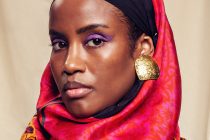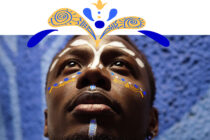MIXED GRILL BANJUL is a children’s clothing brand that literally beams with energy conveyed by the use of vibrant West African prints and colours. And so does the power woman behind it- Joanna Lemnelius. As a mother of three, this creative queen decided to move to her father’s homeland, Gambia, for a year, after being confronted with a darkening Swedish reality, when the racist far-right Swedish Democrats party rose to power in 2014. The decision resulted in creating a brand with beautiful aesthetics and a story of pride, identity, empowerment and a family journey behind it.
– Let’s take it from the start- tell me a bit about Mixed Grill’s beginnings.
When we moved to Gambia in 2014 I got inspired by how extremely fashionable and well-dressed the people are there. I thought: that’s what we should have here in Sweden. I have children myself and they were a huge driving force behind the whole project. I simply wanted these clothes to be worn by children here in Sweden, so that my own children could also feel that their culture is important, appreciated and visible around them.
– Moving to another country with small children, leaving a stable job and life must have been quite an adventure…
When I think back, I almost can’t believe that we really did it. We moved to Gambia quite spontaneously, put the children in a school there and it all worked out just fine. My friends often comment saying that it was a kind of a brave decision, but back then it felt like just the right thing to do and it meant a lot to the whole family. Now I often think “Wow, I’m so glad we did it!”
– How was your connection to Gambia while growing up?
I spent the majority of my upbringing in Sweden with my mum, but when I was 15 I went to live with my family in Gambia for a year and went to school there. I became close with my Gambian family, learned to speak Wolof, and understood my roots and identity. Thanks to that experience I don’t feel split between two identities. I’m no longer uncomfortable being asked where I come from or what my background is. Sometimes I respond I come from Gambia, sometimes I say I’m from Sweden, sometimes I say both. I’ve gotten so much from creating a strong bond with my family there and it’s something I really want to pass onto my children. It is quite complex to have relatives that live far away and are quite poor. Sometimes it’s difficult for a child not to feel distanced from their relatives and understand their reality, which may include not knowing what they will eat the next day. That’s why it’s so important for me that my children got an opportunity to be there, meet their family and get to know them.
– You said your move to Gambia was also a reaction to the racist right-wing party rising to power in Sweden. What is your experience of growing up in Sweden as an Afro-Swedish person?
When I first had my daughter Billy, I learned so much about how difficult it is to be Afro-Swedish in Sweden. To simply be as you are. I’ve always been quite tough and confronted racist episodes during my childhood with a lot of attitude- I could laugh it away or face it in other ways. However, my daughter takes it deadly serious and it breaks my heart to see her struggling. It is depressing to hear her say “I want to be white”, but at the same time it feels quite obvious. How can an eight-year old defend herself in any other way, if nobody else does? She knows now that it’s wrong, but she still takes it very personally. She is still just a kid. Sweden is racist. That is why I want to provide my children with tools to confront it by giving them pride in their culture and showing them that it’s okay to black.
– Please tell me more about your beautiful brand. What is your production like?
There is of course loads of logistics around having a business based in Gambia, while I spend most of my time in Sweden. Just look at my calendar and what’s to come! I’m getting pictures of the new textiles and designs and discussing with my co-workers in Gambia all the time.
My brand helps to create jobs there, yet I am always underlining that it has nothing to do with charity: it is a conscious fashion brand, but it is still a company. I work with a woman named Binta. She is the one organizing the production and providing jobs for the others. Interns get a chance to learn the craft and then get an opportunity to work or start their own businesss. I get so much help from them- it would all be impossible without everyone working on the project.
We also work with a factory in Estonia that produces our woven cotton textiles. I decided to do that since the wax fabric is not that practical for some children’s clothing and I wanted to be able to design some original patterns. So, we produce in Estonia and then ship it to Gambia to construct the clothing. It may feel strange to do that, but at the same time the whole idea of making it in Gambia is my priority. If I could find a jersey and cotton provider in Gambia, it would definitely make things a bit easier…I am open for collaborations!
– Using printed Dutch wax patterns in fashion is often a subject of discussion- how should it be used and who has the right to do it? How do you feel about selling the African textiles to a mainly white Swedish audience?
Many people are a bit concerned and ask if they really can buy that type of clothing for their children. But I feel that most of my clients are conscious people who want to do things right and the reaction so far has been amazing. Of course, I am aware of the mechanisms behind cultural appropriation- it is obvious that white culture has been appropriating black culture for ages without giving it the proper credit. For me it is crucial to credit the source of inspiration, to know where these textiles and patterns come from and to acknowledge the culture behind them. I think culture is a hierarchy and making something visible allows it to be cherished. I want children here wearing African patterns to know where they come from and think they are something beautiful and cool. And that my own children will then feel “Wow, that is mine!”
-What do your family and co-workers in Gambia think about your work?
They sometimes think I am doing crazy things and making weird choices. For instance, some patterns I use are totally out of fashion there. Like the one with the swallows, their reaction is just “Oh my God, this is so old! Please, pick something new”, but the design process is not just based on what I want. It’s a constant dialogue about how to make things. They will often help come up with ideas and changes that make the design work.
– What are the challenges of having a business like yours?
I think that many of our challenges turn into our strengths. For example, as a small business, I can still test and experiment a lot. If I find a very beautiful material in small quantity, I can always do a short line of about 25 or so pieces. If I need any changes, I can discuss them directly with the seamstress. That would never be possible in a huge production factory somewhere else in the world. Also, the effort we put in all our clothes is a part of the story that the clients appreciate. All the difficulties create the vision of our brand and make it authentic and unique. So all the challenges, even if they are really annoying, turn into our strengths. They make it real!
– A good name is also a great part of the brand’s story and identity. How did you come up with Mixed Grill Banjul?
Banjul is Gambia’s capital. I was thinking about all those brands that have Paris or Milan in their name and I thought “Why not Banjul?”, and Mixed Grill is the name of a meat dish, which is simply a selection of the best bits from the grill. It can sometimes lead to funny misunderstandings. I was recently called by my insurance company who told me that it registered us as a meat importer!
– You have recently started your second brand, Sunday Beach, this time with women’s clothing. Why did you decide to do that?
Many customers were asking for clothing for adults, but constructing adult fashion is much more complicated and I felt like I didn’t have the skills to do that. So, I decided to make just one kind of garment, a kaftan. It is my absolute favourite piece and it fits all types of bodies since it comes in one universal size. The design is loosely based on the traditional Gambian garment called grand boubou, but the difference is that my kaftans open in the front.
– And the story behind the name, “Sunday Beach”?
It has to do with the weekly ritual in Gambia: going to the beach with your best clothes, having your favourite food, and meeting up your closest friends. There is something very idyllic and dreamy about it. Going to the beach on Sundays is among my best memories from when I was 15 and lived in Gambia. At the same time, it also has a symbolic meaning. During the presidency of Yahya Jammeh, it was illegal for Gambian people to access the beach at the same time as tourists during the week. It was a completely absurd and bizarre law. However on Sundays, the beach would be free for everybody to use.
– What does your experience teach you about setting up a business in another country and coming to Africa from a position of a person raised in Europe?
I always say “I am not always the one helping, but the one receiving help.” With the help of all the wonderful people that are working with me, I was able to quit my job as a nurse and fulfill my dream of working with my fashion brand full-time. It also taught me about being conscious of the structure of privilege and my own power in this context. For instance, the idea of sustainable fashion for me is not only about sustainable materials, but above all, a sustainable way of working – providing decent wages and a humane view on the hierarchy in the production chain. That means questioning the role of the designer as the top of this hierarchy and looking into the working conditions of those who are actually making the clothing. It is a philosophy that should be reflected in all the parts of creating a brand: from providing decent conditions for the seamstress, to representing healthy body ideals in the brand images. Show people’s value, see how important they are.
– And finally- what do you recommend to others that dream about starting their own business in a similar way that you did?
I recommend: talking to people and researching who your potential future clients might be – what is it that they need, what do they like? Talk to other brands that you like and learn from their story. Dare to share your ideas, ask for help, and inspire others. I want my brand to inspire a hundred other brands producing children’s clothing in Africa. Together we can become so good! I don’t own the idea and there is so much more space for creativity.
Check out Joanna’s designs at www.mixedgrill.se and follow @mixedgrillbanjul & @wearesundaybeach at Instagram.
words by WERONIKA PÉREZ BORJAS
pictures courtesy of Joanna Lemnelius










